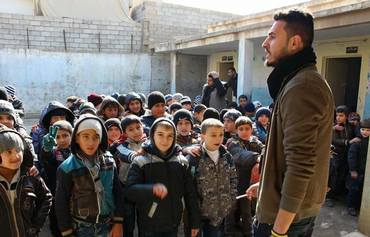Syrian children are facing a growing mental health crisis as a result of the ongoing war, a new report reveals , with experts warning that the psychological effects of the conflict may be impossible to reverse.
The Save the Children report, "Invisible Wounds", released March 6th, is based on a study that includes interviews with 450 Syrian children in seven provinces.
According to the report, 78% of Syrian children feel grief and extreme sadness some or all of the time, and almost all adults said children had become more nervous or fearful as the war has gone on.
"Half of the children interviewed did not feel safe at school or playing outside," the report said.
"The constant psychological strain on children has manifested itself in bed wetting, involuntary urination in public, speech impediments and children losing the ability to speak altogether, and substance abuse," the report added.
Additionally, communities and professionals report a rise in self-harm and suicide attempts among children as young as age 12.
Child psychologist Enas al-Jamal, who lectures at Egypt's Ain Shams University, told Diyaruna the report’s findings were to be expected "considering the suffering Syrian children have experienced throughout the past years".
The report’s findings are "catastrophic" for both the present and future, she said, noting that psychological trauma does not heal easily or quickly.
The scars may fade or become less painful if the child receives therapy away from the traumatic environment, she said, but can still herald deviant behaviour, a gravitation towards violence, a state of constant stress or drug addiction.
Intellectual development also can be affected, she said, while the physical impact of trauma can include migraines and can even lead to heart disease.
Al-Jamal said there is still time to avert disaster, as the report stated, by ending sieges, prevailing on all sides to spare schools and hospitals from hostilities and allowing aid organisations to carry out their work without impediment.
Children’s fear
Media activist Mohammed Shaker, who hails from Harasta in the eastern Ghouta region of Damascus, told Diyaruna he worked with children as a volunteer with the Hurras Network (Guardians of Childhood).
The network's main goal was to get children in the region away from the atmosphere they were living in by engaging them in daily recreational and educational activities, he said.
"Most children did not respond initially, and some believed they were too old to participate in such activities, seeing themselves as adults and too grown up for such things," he said.
"The majority of the children were constantly scared, and the sound of any gunshot or artillery shell, no matter how far away, seriously distracted their attention," he said. "Some even ran for cover, fearing an airstrike."
The children’s conversation revolved mostly around the ongoing fighting and reports of the latest developments they heard from adults, Shaker said.
Armed groups in eastern Ghouta "exploit the children’s mental state to recruit them, and resist any effort to treat the conditions the children suffer from", he said.
These groups "have in fact suspended the operation of the Hurras network", he added.
Psychological trauma
Mahmoud Abdel Nour, a retired government employee from Saraqeb in Idlib province, told Diyaruna he is fully aware of the serious psychological effects the war has had on his two sons, now 14 and 8 years old.
"My eldest son’s condition is serious, because he was aware of all the events that took place since the outbreak of the war in Syria," he said.
His younger son is in better shape, he said, as he is too young to understand all that is taking place.
Abdel Nour said he and his wife carried out a plan that began with "putting in place a study schedule that is not interrupted under any circumstance".
They engage the children in many child-oriented intellectual pursuits, and discuss the prevailing situation with them "in a way that makes it simple to understand or explain without striking fear in their hearts", he said.
"The children who are having a [harder] time are those who did not receive any help from their parents," he said, adding that these children are on the brink of a real disaster.
Abdel Nour expressed his hope that Syria's war will end soon "so the crisis Syrian children are facing comes to an end".

![A Syrian girl stands outside her tent in al-Marj in the eastern Ghouta of Damascus. In a March 6th report, Save the Children revealed the toll the war is taking on the mental health of Syrian children. [Photo courtesy of media activist Adham al-Sherif]](/cnmi_di/images/2017/04/05/7545-Syria-Ghouta-child-600_384.jpg)




